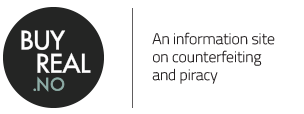Avoid being pirated
Keep a close eye on the market. Make it easy for yourself, dealers and customers to discover and report suspected piracy. Here you will find some tips businesses can consider in order to avoid pirated goods.Search the market regularly for pirated goods
![]() One way of identifying pirated goods is to check the market by making regular and systematic searches on marketplaces and on the internet to discover whether anyone is selling fakes of your products. Some businesses use professionals to do this job, while others do it themselves. It may be useful for a company to prepare procedures that ensure that investigations of this type are performed regularly and systematically.
One way of identifying pirated goods is to check the market by making regular and systematic searches on marketplaces and on the internet to discover whether anyone is selling fakes of your products. Some businesses use professionals to do this job, while others do it themselves. It may be useful for a company to prepare procedures that ensure that investigations of this type are performed regularly and systematically.
Mark your goods with unique signs – anti-pirating technology
 Many pirated goods look apparently identical to the original products. “Genuine fakes” can be difficult to identify. To make it easier to discover fakes, many companies choose to mark their product with secret signs, ideally using different technological methods.
Many pirated goods look apparently identical to the original products. “Genuine fakes” can be difficult to identify. To make it easier to discover fakes, many companies choose to mark their product with secret signs, ideally using different technological methods.
There are various forms of technology that can be effective in protecting genuine products. This type of technology does not necessarily eliminate piracy, but it can make it less attractive and profitable, and increase the chances of being caught for those who engage in producing pirated goods.
There are also technological aids that companies can use for their products, which enable the consumer to recognise pirated goods at the time of purchase. There are, for example, mobile apps with which consumers can check the product and immediately find out whether it is genuine or fake.
Publish list of authorised dealers
 Many companies provide information on who are authorised to deal in their products. They urge customers to notify them if they discover counterfeited goods sold by someone other than an authorised dealer. Your company can publish a list of authorised dealers on it's website. In this way both customers and dealers will be able to follow up their suspicions, and report piracy if they discover that goods are being sold through other suspicious channels.
Many companies provide information on who are authorised to deal in their products. They urge customers to notify them if they discover counterfeited goods sold by someone other than an authorised dealer. Your company can publish a list of authorised dealers on it's website. In this way both customers and dealers will be able to follow up their suspicions, and report piracy if they discover that goods are being sold through other suspicious channels.
If you urge your customers to report suspicious goods, you should make it simple for them to get in touch with you. You can set up a warning function on your website. This will make it easy for customers to report their suspicions, and can contribute to giving your company valuable information about cases that should be investigated more closely.
Agreements with marketplaces on the internet
 A large proportion of counterfeited goods are sold on the internet. Many of the goods are advertised and sold on online digital marketplaces.
A large proportion of counterfeited goods are sold on the internet. Many of the goods are advertised and sold on online digital marketplaces.
As a trademark holder, you can take the initiative to enter into agreements, and cooperate with those who run the online marketplaces. By cooperating in this way, you can help identify fake products, contribute to removing advertising and exclude advertisers who repeatedly infringe your rights. Such cooperation can also contribute to securing evidence that may possibly be used in legal procedures or reporting to the police.
Packaging of genuine branded goods
 Many companies use special packs and packaging featuring the products’ trademarks, bar codes and patent information as a deliberate means of combating piracy. By making multiple packs, and by packaging the genuine branded goods as distinctively as possible, you can make it more difficult for those intending to produce pirated goods. Information on the appearance of the packaging of genuine goods can be shared with the customs authorities. Those who produce pirated goods in principle do not like to spend time and money on copying details of packaging. The customs authorities know that pirated goods often come in simple boxes or in other packaging of poor quality, making it easier for them to distinguish between genuine and fake branded goods.
Many companies use special packs and packaging featuring the products’ trademarks, bar codes and patent information as a deliberate means of combating piracy. By making multiple packs, and by packaging the genuine branded goods as distinctively as possible, you can make it more difficult for those intending to produce pirated goods. Information on the appearance of the packaging of genuine goods can be shared with the customs authorities. Those who produce pirated goods in principle do not like to spend time and money on copying details of packaging. The customs authorities know that pirated goods often come in simple boxes or in other packaging of poor quality, making it easier for them to distinguish between genuine and fake branded goods.
Outsourcing, partners and subcontractors – make sure you have clear agreements on your intellectual property rights
 If your company chooses to outsource production, for example to countries in the Far East, it is important to establish agreements on, and develop guidelines for, the management of intellectual property rights. Ensure that your intellectual property rights are not just registered in the countries where you sell your products but are also registered in the country to which you intend to outsource production.
If your company chooses to outsource production, for example to countries in the Far East, it is important to establish agreements on, and develop guidelines for, the management of intellectual property rights. Ensure that your intellectual property rights are not just registered in the countries where you sell your products but are also registered in the country to which you intend to outsource production.
Investigating your future partners and subcontractors and their attitude to intellectual property rights before you enter into a contract, can have a preventive impact. Investigate whether the company has previously been involved in piracy.
It is important that agreements with partners and subcontractors are quite clear on the fact that trading in pirated goods is unacceptable. They should for example contain clear provisions about returning products, and other consequences of breach of contract in the event of infringements of IPR.
Is it complicated to protect and enforce intellectual property rights outside Europe?
 The registration of rights and enforcement may be complicated and difficult in countries outside Europe. The EU Observatory on Infringements of Intellectual Property Rights has therefore prepared guidelines on intellectual property rights for a number of countries. These are to make it easier for companies and their advisers to manage their rights outside Europe.
The registration of rights and enforcement may be complicated and difficult in countries outside Europe. The EU Observatory on Infringements of Intellectual Property Rights has therefore prepared guidelines on intellectual property rights for a number of countries. These are to make it easier for companies and their advisers to manage their rights outside Europe.
Guidelines have so far been prepared for China, India, Brazil, Turkey and Russia, and offer important basic information and guidelines on how rights holders can protect their intellectual property assets and enforce these in the various countries.
EU Observatory guidelines:







